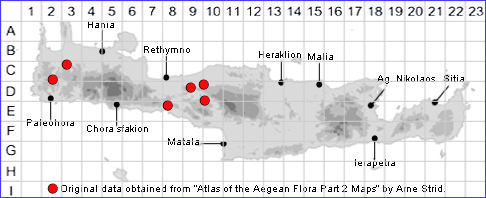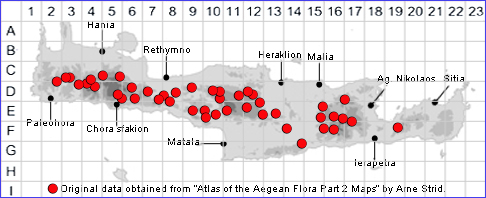~~~~~~~~~~~~~~~~~~~~~~~~~~~~~~~~~~~~~~~~~~~~~~~~~~~~
PRUNELLA LACINIATA
Family and Genus:- See- LABIATAE
Common Names:- Cut-leaved-self-heal.
Homotypic Synonyms:- Prunella alba, Prunella grandiflora var. laciniata,
Prunella vulgaris subsp. alba, Prunella vulgaris var. laciniata, Prunella
vulgaris subsp. laciniata.
Meaning:- Prunella. From the German name, Die Braune, for quincy, for which it
was once used as a cure.
Laciniata (L) Jagged, fringed, with many flaps.
General description:- Pubescent perennial herb.
Stems:-
1) Up to 30 cm, often procumbent, pilose.
Leaves:-
1) 4-7 x 2-3 cm;
a) lower, long-petiolate; blade narrowly elliptical, entire or coarsely and
irregularly serrate.
b) upper, short-petiolate or subsessile, usually deeply pinnatifid or lobed.
Flowers:-
1) Inflorescence, subtended by leaves.
2) Bracts, 10 x 15 mm.
3) Calyx, 8-11 mm, 2-lipped;
a) upper lip, broadly rectangular with 3 short, apiculate teeth.
b) lower lip, split halfway into narrowly lanceolate, ciliate teeth.
4) Corolla, 15-17 mm, yellowish-white, rarely rose-pink or purplish.
Fruit:-
1) Nutlets, c. 2.5 mm.
Key features:-
1) Corolla, yellowish-white, rarely pink or purplish, not more than 17 mm.
2) Inflorescence, usually subtended by leaves.
3) Leaves, at least the upper pinnatifid or lobed.
4) Calyx, teeth of lower lip linear-lanceolate.
Habitat:- Seasonally damp patches in mixed scrub, open woodland and
agricultural habitats. 0-800(-1200).
Distribution:- Throughout mainland Greece, Peloponnisos and Ionian Islands. -
Widespread in the Mediterranean region and SW Asia, extending to W and SC
Europe. On Crete known from only a few scattered locations in the west. Rare
Flowering time:- (Apr-)May-June(-Aug).
Photos by:- Viv Walker
SPECIES DESCRIPTION

PRUNELLA CRETENSIS
Synonyms:- None.
Meaning:- Cretensis (L) From Crete, Cretan.
Resembling Prunella laciniata, but differering in the following characters
1) Calyx, somewhat smaller;
a) upper lip, broad, rounded, entire or somewhat undulate.
b) lower lip, split almost to the base.
Habitat:- As for Prunella laciniata.
Distribution:- Cretan endemic, usually confined to the four main massifs.
Flowering time:- (Apr-)May-June(-Aug).
Status:-
Conservation status (for threatened species): Rare (R) according to IUCN 1997.
Protection status (for threatened species): Greek Presidential Decree 67/1981.
Photos by:- Steve Lenton

